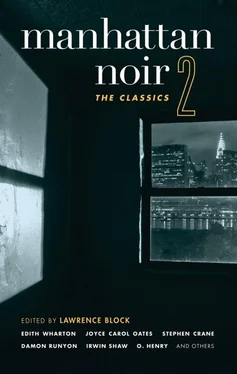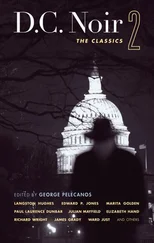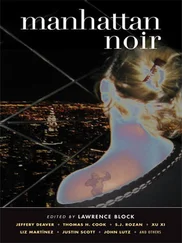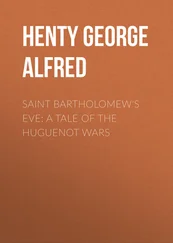He started for the door and Debbie followed him. At the door, he paused and gave her the rest of the pack of gum. “Your mother’s right, you know,” he told her. “You really shouldn’t talk to strangers or take gum or anything. Promise me you won’t do it again.”
Smiling shyly, Debbie said, “I promise, George.”
Simms opened the door and stepped into the corridor. Max Wallace, just hurrying up, put a gun in his face. “Move a muscle and you’re gone,” he said coldly.
Simms froze. Lupe Mercado rushed past him to gather Debbie into her arms. “My baby! What did he do to you?” she cried.
“I didn’t do anything to her—” Simms started to protest.
“Shut up!” Wallace ordered.
Peering past Wallace’s shoulder, Charlie Hosey’s face brightened. “Now I remember you! You’re the bank teller! I always thought you looked familiar—”
Wallace frowned. “That Chase Manhattan embezzler you told me about?”
“That’s the one,” said Hosey. “The one who hooked up with the Lana Turner lookalike.”
Wallace snatched the pillowcase from Simms and looked inside it. “Well, I’ll be damned,” he whispered.
“It must have been hidden in that room all these years,” Hosey said. “Eighty thousand dollars.”
Lupe stared at the bundles of currency in the pillowcase, then turned her eyes incredulously to Simms, her lips parted in stunned disbelief. Wallace put handcuffs on Simms and started leading him away.
“Why didn’t you tell me?” Lupe asked, following them down the hall, indignation rising. “We could have shared it! We could have both got out of this sewer! Why didn’t you trust me enough to tell me?”
“Me trust you? ” Simms said. “You didn’t even trust me enough to give your kid a stick of gum!”
In the middle of the corridor, Wallace pushed Simms onto the elevator. “You could have tried! ” Lupe said. Then more softly she added, “ I could have tried—”
“Well, it’s too late now,” Simms said flatly as the elevator door closed them off from each other for the last time.
Young Isaac
Jerome Charyn
Lower East Side
(Originally published in 1990)
It was West Broadway, a land of small factories that could have produced every button and zipper in the world. Isaac loved to spy on all these button and zipper men, who would leave their lofts in the middle of the afternoon and congregate in a candy store, where they drank a curious concoction of malt and cream soda. They’d arrived in the ’20s from London’s East End. The language they spoke was almost indecipherable, even though Isaac’s dad had come out of the same streets. But Joel Sidel didn’t struggle over zippers. He was the fur-collar prince, and he was gathering a nice little nest. He had an exclusive contract with the Navy to manufacture fur collars for foul-weather coats. It kept him out of the war. He was already a millionaire in 1943, but he wouldn’t give up the tiny house that was ensconced between two button factories. “I’m one of the downtown Sidels,” he liked to say. “Never was an uptown man.” He wore suspenders lined with jewels. He had mistresses of every persuasion. He neglected his wife and children and ran to the Salmagundi Club, where he mingled with artists, because Joel would rather have been a painter than a fur-collar prince. He wanted the Germans to get the hell out of Paris, so he could move in. “How can I go to Montmartre and meet Picasso when there’s storm troopers on every block?”
If Isaac tried to reason with him — “Dad, Dad, you have your business in Manhattan” — the West Broadway Picasso would cuff him on the ear.
“What would you know? You’re a truant. You lie. You steal.”
Isaac could have returned the cuff. At thirteen he was a head taller than Joel. But he wouldn’t have hit his own dad. He loved the old man, as much as he could love a father who played the Bedouin with his own family. If Isaac had become a thief, wasn’t it out of some dread that Joel would abandon him? Joel had his new Jerusalem: the hills of Montmartre. And Isaac had his wealth of ration stamps.
The stamps came in buff-colored booklets issued by the OPA, Office of Price Administration. It was a federal offense to traffic in stolen stamps. “Persons who violate rationing regulations are subject to $10,000 fine or imprisonment, or both.” That’s what it said on the front of each book. But Isaac prized the blue and red stamps, with their pictures of cannons and tanks, aircraft carriers and fighter planes...
He never sold a book to individual clients. That would have been dumb. Because the OPA had their own detectives. Isaac always used a middleman, Stoney Whitehall, the air raid warden. Stoney could work up a deal during air raid drills, while he wore his white helmet and poked around with a whistle and a flashlight, snarling, “Close the blinds, will ya? It has to be midnight.”
He took whatever merchandise Isaac had, paying him in old, crumpled bills that could never be traced back to Stoney himself. When Isaac’s supply was low, the warden would mutter, “I need product, kid. I can’t go out empty-handed. I might get killed.”
Isaac wasn’t a wholesaler. He could clip only one book at a time, from absentminded mothers who left their purses open or forgot to lock their doors, from housewives at the Essex Street indoor market who were much too busy counting their change to notice Isaac Sidel. He was very agile for a boy who resembled a bear. He had none of the obvious signs of a thief. He wasn’t nervous. His eyes didn’t wander. He didn’t drool at the mouth, or play with himself in front of the housewives. He could linger at a merchant’s stall. He was the son of Joel Sidel. He would buy fruit for his woeful family. There was always an alibi for Isaac.
But the warden wouldn’t leave him alone. He waylaid Isaac outside the Essex Street market.
“Stoney,” Isaac said, “you shouldn’t come here. People will talk.”
“Never mind. Gimme what you got.”
He ripped at Isaac, removed the single booklet Isaac had pocketed in his pants. The booklet cost Isaac an hour’s work. The boy had waited like a spider, hovered between two stalls, to catch the right victim. And now Stoney was ruining Isaac.
He slapped the boy. Isaac swallowed blood. Merchants wandered in and out of the market. Stoney walked away.
It was one more piece of bitterness Isaac had to bear. He was losing his dad to the Salmagundi Club and some phantom idea of art. His mom had opened a junk shop to show the fur-collar prince she could survive without him, while his baby brother Leo still pissed in his pants.
Isaac couldn’t forget that slap. He met Florsheim, the assistant principal, near the Loew’s Delancey. Florsheim was a failed scholar of Greek. He’d abandoned Euripides to become a glorified custodian in the public schools of New York. It was from Florsheim that Isaac had learned about the terrible fate of men and women in a wounded world. Isaac had been his best pupil before he eloped from P.S. 88 to begin his career as a criminal.
“I know,” Florsheim said, sadness on his scholar’s face. He looked like a consumptive child. He was much more delicate than the girls and boys he had to guard. Isaac had disappointed him.
“Fourteen days.”
“I don’t feel good,” Isaac said. “I need the fresh air.”
“Is that why you live inside a market, breathing chicken feathers?”
“I have to shop,” Isaac said. “We’re alone. My father’s new address is the Salmagundi Club.”
Florsheim touched him with a hand that felt like a broken wing. Isaac couldn’t even consider it a slap.
“You’re stealing ration stamps.”
Читать дальше












